学术英语理工类Unit-1答案
理工英语1第1单元自测题库及答案国开大

• 题目:What are the benefits of taking理工英语1? 答案:Taking理工英语1 can provide students with the opportunity to develop their professional communication skills, increase their knowledge of English language and culture, and prepare them for further academic and career development. 解析: 学习理工英语1可以为学生提供发展专业沟通技能的机会,增加他们对英语语言和文化的了解,并为他们进一步的学术和职业发展做好准备。
• 答案:The main purpose of理工英语1 is to develop students' English language skills and enhance their ability to communicate effectively in English in various professional contexts.
02 d e s i g n
答案:design
03
题目:The _____ of the machine operation. 答案:maintenance
学术英语(理工)_Unit 1

Universe
Unit 1 Choosing a Topic
1 Deciding on a topic
What is the main idea that each essay tries to illustrate? Text 1 illustrates how hackers or unauthorized users use one way or another to get inside a computer, while Text 2 describes the various electronic threats a computer might face. In which aspect do the two essays share the same idea? Both focus on the vulnerability of a computer.
Unit 1 Choosing a Topic
1 Deciding on a topic
Enhancing your academic language
Match the words with their definitions.
parameter (限定因素) of time and budget 12 work within the __________ interpretation (解释) 13 thanks for your kind _____________ 14 use many __________ technical (专业的) terms range 15 Prices __________ (变化范围) from 340 U.S. Dollars to 390 U.S. Dollars. exploit 16 __________ (开拓) a new market in the city networking (社交网络) 17 be absorbed in the social __________ involve 18 __________ (涉及) unnecessary extra charges instance (实例) out of many 19 only one __________ specification (具体的细节) of 20 get to know more about the __________ the wedding accompany (陪伴) with her to watch movies 21 __________
学术英语理工类Unit-1答案
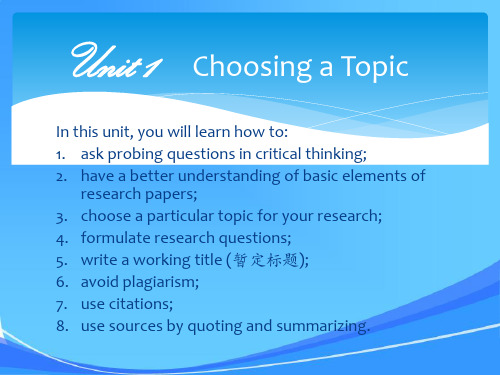
Because it will contribute to the credibility of the research.
3. Why is the procedures section important?
research papers; 3. choose a particular topic for your research; 4. formulate research questions; 5. write a working title (暂定标题); 6. avoid plagiarism; 7. use citations; 8. use sources by quoting and summarizing.
1. How many basic elements are there in a research report or paper? What are they?
Four. They are problem section, procedures section, result section and discussion section.
4. Do you think it necessary to learn how to read and even write research papers? Why?
1. Critical Reading
How to read research articles
Read the article “Research Reports for Technical Writing” on Page 24-26 and answer the questions below.
《学术英语》(理科)课后答案(完整版)

ContentsUnit 1 – Astronomy (2)Part I: Pre-listening (2)Part II: While Listening (2)Text A: Fun Facts about Astronomy (2)Text B: Shenzhou-10 Mission (3)Part III: After Listening (3)Part IV: Homework (3)Unit 2 – Biology (4)Part I: Pre-listening (4)Part II: While Listening (4)Text A: Secret of Life (4)Text B: Animal Intelligence (5)Part III: After Listening (5)Part IV: Homework (5)Unit 3 – Psychology (6)Part I: Pre-listening (6)Part II: While Listening (6)Text A: Discovering Psychology (6)Text B: Liespotting (7)Part III: After Listening (7)Part IV: Homework (7)Unit 4 – Geography (8)Part I: Pre-listening (8)Part II: While Listening (8)Text A: What Is Geography? (8)Text B: Mount Kailash – Axis of the World (9)Part III: After Listening (9)Part IV: Homework (9)Unit 5 – Economy (sic) (10)Part I: Pre-listening (10)Part II: While Listening (10)Text A: The Blue Economy (10)Text B: A Monkey Economy as Irrational asOurs (11)Part III: After Listening (11)Part IV: Homework (11)Unit 6 – Physics (12)Part I: Pre-listening (12)Part II: While Listening (12)Text A: What Is Physics? (12)Text B: Science of Figure Skating (13)Part III: After Listening (13)Part IV: Homework (13)Unit 7 – Computer Science (14)Part I: Pre-listening (14)Part II: While Listening (14)Text A: Computer Software (14)Text B: Computer Science Advice forStudents (15)Part III: After Listening (15)Part IV: Homework (15)Unit 8 – Chemistry (16)Part I: Pre-listening (16)Part II: While Listening (16)Text A: The History of DiscoveringElements (16)Text B: The Periodic Table of Elements (17)Part III: After Listening (17)Part IV: Homework (17)Unit 1 – AstronomyPart I: Pre-listeningC: Listening Exercise1. D – Mars.2. C – For finding their way across hugeareas of ocean.3. C – Almost every ancient culture knewof these five mysteries.4. A – Saturn, Jupiter, Venus, Mercury andMars.5. C – The study of stars.Part II: While ListeningText A: Fun Facts about Astronomy Exercise 1 – Global Understanding1.Two branches: (1) observationalastronomy and (2) theoreticalastronomy.2.Aspects: fun facts about (3) the sun(4) the moon(5) the stars(6) the planetsExercise 2 – Listening and Note-takingThe better notes are _A_, because:1.Good notes should consist of keywordsor very short sentences, not every word.e abbreviations and symbols thatmake sense to you can help you writedown notes quickly.3.Leave space between topics or ideas soyou can scan the page more easily later. Exercise 3 – In-depth Listening1.Mercury is the (1) second smallestplanet in the solar system and has (2)no moon. It can get as hot as (3) 800 °Cand cold as (4) 300 °C below zero. Oneyear on Mercury is equal to (5) 88 dayson Earth.2.Venus is the only planet that rotatesfrom (6) east to west. A year on thisplanet is equal to (7) 225 days on Earth.3.Earth is nearly (8) 93 million miles awayfrom the sun. It takes about (9) 16million horsepower to break the Earth’sgravitational pull.4.According to scientists, in around (10) 5billion years, a day on Earth will be (11)48 hours long and somewhere duringthat time the sun will explode.5.The planet Neptune was discoveredmore than (12) 150 years ago in 1846,and since then it still has to complete anorbit around the sun, as one Neptuneyear equals to (13) 165 Earth years.6.Pluto’s size is very small which madescientists demote it to a (14) dwarfplanet status.Text B: Shenzhou-10 MissionExercise 1 – Global Understanding1.June 24th.2.China hasn’t set up a permanent spacestation.Exercise 2 – Listening for Details1.False2.True3.Not GivenExercise 3 – Compound Dictation1.blasted off2.docked3.conduct experiments4.June 20th5.gave a lecture6. a manual docking procedure7.spoke8.two-way video link9.flew around10.the modulePart III: After ListeningPart IV: HomeworkA – Listening Task1.supremacy2.gesture3.vowed4.hostile5.decade6.mission7.spotted8.It was five kilometers from base andthey were running dangerously short oftime9.The orange soil looked like evidence ofrecent volcanic activity 10.In just half an hour, Schmitt and Cernangathered all the orange soil they couldlay hands onUnit 2 – BiologyPart I: Pre-listeningA: Talk about the Topic1.Hummingbird (c); Marmoset (a); Ostrich(d); Sloth (b); Venus flytrap (g); Cheetah(f); Bamboo (h); Rafflesia (e)2.as sly as a fox; as timid as a hare; ascheerful as a lark; as silly as a goose; asgreedy as a wolf; as proud as a peacock;as strong as a horse; as brave as a lion;as gentle as a lamb; as stubborn as amule; as busy as a bee; as blind as a bat C: Listening Exercise1. D – Hostess and guest.2. B – Genetically modified organism.3. A – Corns with a 4-digit PLU code.4. C – Because there is no proof that GMfoods are safe.5. C – From PLU code on the produce. Part II: While ListeningText A: Secret of LifeExercise 1 – Global Understanding1.nucleus2.mush3.membranes4.protein5.energy6.chromosomesExercise 2 – Listening and Note-taking1.frogspawn2.divide and divide3.replicating4.specialize5.body parts6.true of us7. a single cell8.two fundamental rules of life9.made of cells10.other cells11.what life wasExercise 3 – In-depth Listening1.17th2.Robert Hooke3.microscope4.snowflakes5.natural fibers6.mid-19th7.resurfaced8.well-engineered9.exposeText B: Animal IntelligenceExercise 1 – Global Understanding1. B – To prove that dolphins are thinkingspecies.2. C – Self-awareness.Exercise 2 – Listening for Details1.True2.Not Given3.False4.True5.FalseExercise 3 – Compound Dictation1.reacting2.another dolphin3.back and forward4.testing to see5.the same things6.neck stretches7.marked part8. a mirror9. a toolPart III: After ListeningPart IV: HomeworkA – Listening Task1.filtered sunlight2.fade3.sensitive4.evaporate5.pebbles6.moist7.snippers8.start up9.indestructible10.raise alarm11.a shadier location 12.polluted water13.reddish14.decaying or mushy15.indoor environmentsUnit 3 – PsychologyPart I: Pre-listeningA: Talk about the Topic2.1-d, 2-a, 3-f, 4-g, 5-c, 6-e, 7-h, 8-b C: Listening Exercise1. B – He has just moved to a new place.2. A – He should take Fido to the vet.3. D – He will put his dog on medication.4. A – Dog emotions are quite similar tothe emotions of humans.5. C – Harry is an expert on brain scienceof humans and dogs.Part II: While ListeningText A: Discovering Psychology Exercise 1 – Global Understanding1.behavior of individuals2.mental processes3.dispositional factors4.situational factors5.experimental psychology laboratory6.Principles of PsychologyExercise 2 – Listening and Note-taking1.sci entific study2.res earch3.pred ict & (ctrl) control behav ior4.gene tic5.att itudes, ment al6.sens ory stimul ation7.rew ards, act ionsExercise 3 – In-depth Listening1.18792.Germany3.first experimental psychologylaboratory4.18836.first American psychological laboratory7.18909.psychological text10.Principles of PsychologyText B: LiespottingExercise 1 – Global Understanding1. D – He peppered his account with alittle too much detail.2. B – A fake smile will betray a liar. Exercise 2 – Listening for Details1.Not Given2.False3.False4.True5.FalseExercise 3 – Compound Dictation1.lower2.pause3.pepper4.detail5.chronological6.backwards7.words8.gesturesPart III: After ListeningPart IV: HomeworkA – Listening Task1.signs of the condition2.low levels of light3.severe form4.thoughts of death or suicide5.designed6.sleep7.active8.sugary water9.more depressed10.least11.blue and white light12.dim red 13.signals14.natural sleep-wake cycle15.recommendation16.exposure17.bluish18.reddishUnit 4 – GeographyPart I: Pre-listeningA: Talk about the Topic1.a. 4.5 to 4.6 billion yearsb.149,597,870 kmc.384,403.1 kmd.Mt. Everest, Asia: 8844.43 me.Dead Sea: -422 mf.Mariana Trench, Western PacificOcean: 11,034 mg.56.7°C (Greenland Ranch in DeathValley, California, July 10, 1913)h.-89.2°C (Vostok, Antarctica, July 21,1983)2.1-a; 2-c; 3-f; 4-b; 5-e; 6-d; 7-gC: Listening Exercise1. D – New Zealand.2. C – The south of the country can bewarm in summer.3. C – A map showing geographicalfeatures.4. B – The coverage of oceans.5. C – She wants to know more aboutgeography.Part II: While ListeningText A: What Is Geography?Exercise 1 – Global Understanding1.Cultural geography focusing on peopleand cultures.2.Physical geography focusing on planetEarth. Exercise 2 – Listening and Note-takingFive these of geographyA. LocationB. PlaceC. Human-environment Interaction1. Humans depend on the environment2. Humans modify the environment3. Humans adapt to the environmentD. MovementE. Region1. Formal regions2. Functional regions3. Vernacular regionsExercise 3 – In-depth Listening1.earth2.to write3.climates4.plant and animal distributionputerized mapping6.data analysisText B: Mount Kailash – Axis of the World Exercise 1 – Global Understanding1. A – Because it matches the legend ofthe axis of the world.2. D – Because it is the most importantpilgrimage site in Tibet.Exercise 2 – Listening for Details1.False2.True3.Not Given4.False5.FalseExercise 3 – Compound Dictation1.pilgrimage site2.Buddha’s e nlightenment3.newly dressed altar4.prayer flags5.end up straight6.wind horsesPart III: After ListeningPart IV: HomeworkA – Listening Task1.233 countries2. a bit ambiguous3.semi-presidential republic4.6,592,800 square miles5.northern part of Asia6.11 different time zones7.climate conditions8.energy and minerals9.greatest forest reserves10.unfrozen freshwater11.ninth most populous12.lungs of Europe13.by volume 14.780 species of birds15.third largest economy16.fastest aging country17.Three Gorges Dam18.at a country’s disposalUnit 5 – Economy (sic)Part I: Pre-listeningA: Talk about the Topicpete with one another; positive; aninvisible hand2. a long time; stall along the wayC: Listening Exercise1. B – He is interested in making modelboats.2. C – She is considerate and thoughtful.3. A – It will help children learn the valueof money.4. D – He will give Jacky a regularallowance soon.5. D – Saving money for larger costs willhelp children learn how to budget. Part II: While ListeningText A: The Blue EconomyExercise 1 – Global Understanding1.expensive2.not smart3.creative4.healthy and happy5.what we did not know we have Exercise 2 – Listening and Note-taking1.healthy and naturalanic3.solar energy4.biodegradable5.palm oil6.destroy the rain forest7.subsidies8.tax moneypete with food10.damaging the climate11.expensive12.not smartExercise 3 – In-depth Listening1.Not Given2.True3.False4.TrueText B: A Monkey Economy as Irrational as OursExercise 1 – Global Understanding1. D – When they are facing a loss.2. A – People are irrational because theywant to make more money.Exercise 2 – Listening for Details1.10002.10003.04.5005.Play it safe6.20007.10008.09.50010.Take a riskExercise 3 – Compound Dictation1.different directions2.good or not3.switch4.loss mindset5.risky6.worrying7.losing stocks longer8.sell their housePart III: After ListeningPart IV: HomeworkA – Listening Task1.economic prosperity2.support strengthening3.premier forum4.lowering tariffs5.non-discriminatory6.greater participation7.integrated economic community8.critical energy sector9.interconnectivity10.renewablepletion of negotiations12.far-reaching trade agreement13.rules-based and high-standard14.mere short term15.multilaterial and bilateral partnershipsUnit 6 – PhysicsPart I: Pre-listeningA: Talk about the Topic1.1-f; 2-b; 3-e; 4-d; 5-g; 6-a; 7-h; 8-c C: Listening Exercise1. B – They are doing a physicalexperiment.2. C – Six.3. D – Judy helped to pinch the balloontight.4. B – Mike is very smart.5. A – They pumped some gas into theballoon.Part II: While ListeningText A: What Is Physics?Exercise 1 – Global UnderstandingTwo categories of physics:(1) Classical physics(2) Modern physicsMain purposes of learning physics:(1) To understand the world around people(2) To explain the universe at large Exercise 2 – Listening and Note-taking1.Definition2.motion of matter3.space and time4.energy5.force6.effects7.philosophy8.world9.classical10.modern11.Applications12.electromagnetism13.mechanics14.quantum physics Exercise 3 – In-depth Listening1.matter moves2.object attraction3.heat and energy4.mass-energy5.space-time6.electric chargesText B: Science of Figure Skating Exercise 1 – Global Understanding1. C – The science of figure skating.2. D – All of the above.Exercise 2 – Listening for Details1.False2.False3.True4.Not Given5.FalseExercise 3 – Compound Dictation1.action and reaction2.vertical velocity3.velocity4.higher5.spin6.extended7.slowly8.closer9.faster10.following11.Conservation of Angular Momentum Part III: After ListeningPart IV: HomeworkA – Listening Task1.powered by sun light2.20153.63 meters across4.200 square meters5.cells6.140 kilometers7.8,500 meters8.stops9.20 to 2510.autopilot 11.goal12.appliancesUnit 7 – Computer SciencePart I: Pre-listeningA: Talk about the Topic1.1-Wechat; 2-MSN; 3-Tencent QQ; 4-Sina Microblog; 5-Renren Network; 6-Instagram2.MSN, Tencent QQ, Renren Network,Sina MNicroblog, Instagram, Wechat C: Listening Exercise1. D – A research on the applications ofcomputers and Internet.2. C – Playing computer games.3. B – Computers can help edit jobapplication documents.4. C – Online shopping has become anessential part of our life.5. A – People may be cheated by someoneonline.Part II: While ListeningText A: Computer SoftwareExercise 1 – Global Understanding1. D – Software programs and theoperating system.2. B – A set of instructions that tells thecomputer what to do.Exercise 2 – Listening and Note-taking1.most of us don’t speak the ir language2.is like a translator3.the computer what to do4.personalized5.Mac6.Linux7.Operating system8.Software programs9. a computer store10.download from the InternetExercise 3 – In-depth Listening1.True2.FalseAn operating system can cover thebasics from saving files to fixingproblems.3.FalseYou can get computer software from acomputer store or download them fromthe Internet without the help ofcomputer engineers4.FalseSoftware programs can makecomputers personalized5.TrueText B: Computer Science Advice for StudentsExercise 1 – Global Understanding1. C – Advice for students on computerscience.2. A – Computer science is highlyinteractive.Exercise 2 – Listening for Details1.False2.True3.True4.Not GivenExercise 3 – Compound Dictation1.fallacies/misconceptions2.programming3.people4.business analysts5.discuss6.solve7.logical thinking8.capture things9.articulate10.connectingPart III: After ListeningPart IV: HomeworkA – Listening Task1.index of the web2.software programs3.webpages4.follow all the links5.chunk of the web6.hit return7.possible8.contain your keywords9.directly adjacent 10.spamming11.outside links point to itmitment13.impartial search results14.a snippet of the text15.related searches16.advertising business17.strive to18.cheetah’s top running speedUnit 8 – ChemistryPart I: Pre-listeningA: Talk about the Topic1.A, C, and E are chemical reactionsC: Listening Exercise1. A – In 1828.2. D – He created them from twoinorganic substances.3. C – People isolated it from living things.4. C – It proved that organic substancescan be created from inorganicsubstances.5. D – Atoms.Part II: While ListeningText A: The History of Discovering ElementsExercise 1 – Global Understanding1.diversity of natureplexity of man3.92 elements4.the most important codes5.making of the modern world Exercise 2 – Listening and Note-taking1.what an element is2.lead, copper, gold, silver, iron, mercury,tin3.metals4.earth, air, fire, and water5.16th6.metals into goldExercise 3 – In-depth Listening1.attempted2.electricity3.natural4.ultimately5.insight6.physics7.mysteries8.detective9.centuries10.struggled11.fascination12.destructionText B: The Periodic Table of Elements Exercise 1 – Global Understanding1. B – How the periodic table of elementswas discovered and its significance.2. B – It changes the way that everyonewould learn and understand theelements.Exercise 2 – Listening for Details1.True2.False3.Not Given4.True5.FalseExercise 3 – Compound Dictation1.18692.explain3.properties4.similarities5.patterns6.vertical7.resembled8.existence and properties9.rightPart III: After ListeningPart IV: HomeworkA – Listening Task1.green leaves2.grows underground3.for their taste4.traditionally for health reasons5.seeking to lose weight6.desire to eat7.reduce hunger8.Over six weeks9.each group 10.three-tenths of a gram11.normally eat12.especially true13.may be lost14.extend the effectiveness15.a tropical plant16.its medical possibilities17.earlier evidence18.brains of patients19.sixty to ninety-three years old20.rarely or never。
大学学术英语教材答案
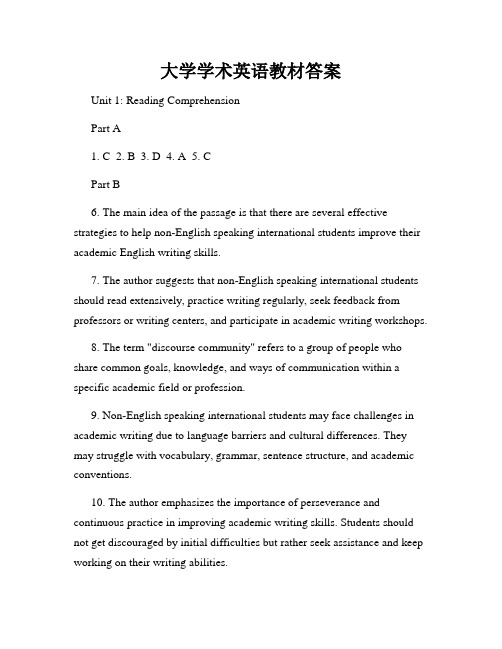
大学学术英语教材答案Unit 1: Reading ComprehensionPart A1. C2. B3. D4. A5. CPart B6. The main idea of the passage is that there are several effective strategies to help non-English speaking international students improve their academic English writing skills.7. The author suggests that non-English speaking international students should read extensively, practice writing regularly, seek feedback from professors or writing centers, and participate in academic writing workshops.8. The term "discourse community" refers to a group of people who share common goals, knowledge, and ways of communication within a specific academic field or profession.9. Non-English speaking international students may face challenges in academic writing due to language barriers and cultural differences. They may struggle with vocabulary, grammar, sentence structure, and academic conventions.10. The author emphasizes the importance of perseverance and continuous practice in improving academic writing skills. Students should not get discouraged by initial difficulties but rather seek assistance and keep working on their writing abilities.Unit 2: Vocabulary and GrammarPart A11. intensify12. abstract13. biased14. acquire15. fundamental16. authentic17. subtle18. context19. coherent20. graspPart B21. The internet has revolutionized the way we access information.22. The new manager aims to streamline the company's operations and increase efficiency.23. The scientist conducted a comprehensive study on the impact of climate change.24. The concert attracted a diverse audience of all ages and backgrounds.25. The legal system should ensure equal treatment and justice for all individuals.Unit 3: Listening ComprehensionPart A26. B 27. C 28. A 29. D 30. DPart B31. The main purpose of the presentation is to inform the audience about the benefits of studying abroad.32. The presenter mentions that studying abroad can help students develop cross-cultural communication skills and enhance their global perspectives.33. The presenter mentions that studying abroad can provide students with opportunities to immerse themselves in a different academic environment and gain a deeper understanding of their field of study.34. The presenter suggests that studying abroad can contribute to personal growth and self-confidence, as students face challenges and adapt to a new cultural context.35. In conclusion, the presenter encourages students to consider studying abroad as a valuable and transformative experience that can enrich their personal and academic lives.Unit 4: SpeakingPart A36. There are several potential advantages of group work in academic settings. First, it promotes collaboration and teamwork skills, which are highly valued in many professions. Second, it allows for the sharing of diverse perspectives and ideas, which can lead to deeper learning and innovative solutions. Third, it helps develop communication and interpersonal skills as students interact and negotiate with their peers. Overall, group work provides a more engaging and interactive learning experience.Part B37. In my opinion, the most effective method of note-taking depends on individual preferences and learning styles. For visual learners, using mind maps or diagrams can be helpful in organizing information. For auditory learners, recording lectures and listening to them later can aid in comprehension. For kinesthetic learners, hands-on activities such as drawing or writing summaries can facilitate retention. Ultimately, students should experiment with different methods and find what works best for them.Unit 5: WritingPart A38. Introduction: The purpose of this essay is to discuss the advantages and disadvantages of using social media in education.39. Advantages: Social media can facilitate communication between students and professors, allow for easy access to educational resources, and promote collaborative learning.40. Disadvantages: Social media can lead to distractions, privacy concerns, and potential misinformation or lack of credible sources.41. Conclusion: In conclusion, the use of social media in education has both positive and negative implications. It is crucial for educators and students to approach it mindfully, making use of its benefits while being aware of its drawbacks.Part B42. In my opinion, it is essential for universities to provide academic English courses for non-English speaking students. These courses can help students improve their language skills, particularly in academic writing and speaking. Proficiency in academic English is crucial for success in higher education and future careers. Additionally, these courses can also provide cultural orientation and support, helping international students navigate the challenges of studying in a foreign country. Overall, academic English courses contribute to a more inclusive and supportive learning environment for all students.Note: This sample answer is for reference only and may vary depending on the specific questions and content of the textbook. It is recommended to refer to the actual textbook or teaching materials for accurate and complete answers.。
学术英语(理工)详解答案-Unit

编辑校对
对科学与工程研究论文进行仔细的 编辑和校对,确保语法和逻辑的准 确性。
科学与工程领域的口头表达和演示策 略
1 表达技巧
掌握有效的科学演示技巧,清晰地传达研究成果。
2 视听效果
利用适当的视听效果,增强科学演示的吸引力和可理解性。
3 Q&A环节
能够娴熟地应对观众的提问并给出明确而准确的答复。
学术英语专业交流技巧
社交媒体
利用社交媒体平台展示专业知识和研究成果,吸引潜在机会。
行业相关活动
参与行业相关活动,扩大与其他专业人士合作的机会。
3 常见错误
学术英语中常见的错误包括语法结构、词汇使用和格式规范等方面。
科学与工程学术写作的基本规则
方法
选择适当的方法来进行科学与工Байду номын сангаас研究,并清晰地描述实验过程。
结果
详细记录实验结果,并用准确的数据和图表展示。
讨论
对实验结果进行深入分析和解释,并提出合理的结论。
有效阅读和理解科学文章的技巧
专业词汇
学术英语(理工)详解答案Unit
从科学和工程的角度解读学术英语,了解其定义、意义和常见错误,掌握学 术写作的基本语法规则和领域词汇,并获得在学术环境中进行有效沟通的技 巧。
学术英语的定义与意义
1 定义
学术英语是科学和工程领域中用于研究、写作和沟通的特定语言风格。
2 意义
学术英语对于科学与工程领域的专业发展和学术交流至关重要。
1
写电子邮件和专业函件
2
培养写邮件和专业函件的技巧,提高文字
表达能力。
3
与同事和顾问交流
学会与同事和顾问保持良好的沟通,提高 工作效率。
学术综合英语参考答案unit1
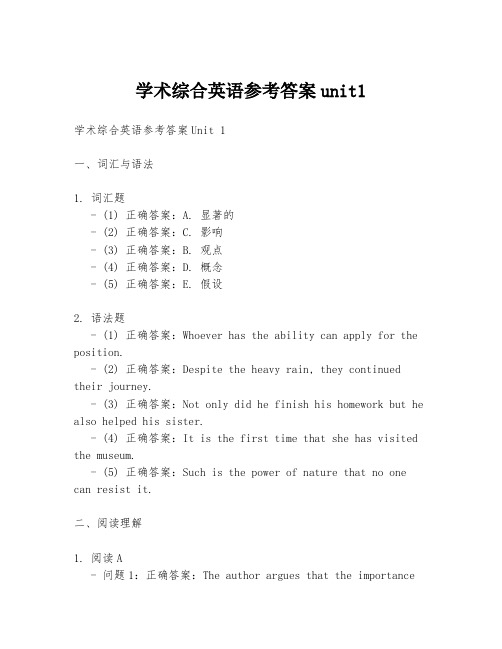
学术综合英语参考答案unit1学术综合英语参考答案Unit 1一、词汇与语法1. 词汇题- (1) 正确答案:A. 显著的- (2) 正确答案:C. 影响- (3) 正确答案:B. 观点- (4) 正确答案:D. 概念- (5) 正确答案:E. 假设2. 语法题- (1) 正确答案:Whoever has the ability can apply for the position.- (2) 正确答案:Despite the heavy rain, they continued their journey.- (3) 正确答案:Not only did he finish his homework but he also helped his sister.- (4) 正确答案:It is the first time that she has visited the museum.- (5) 正确答案:Such is the power of nature that no one can resist it.二、阅读理解1. 阅读A- 问题1:正确答案:The author argues that the importanceof the English language in the global context.- 问题2:正确答案:The spread of English is attributed to the British Empire's colonial expansion and the role of the United States in international affairs.- 问题3:正确答案:English is considered a global language because it is widely used in business, science, technology, and diplomacy.2. 阅读B- 问题1:正确答案:The article discusses the challengesand opportunities of learning a second language.- 问题2:正确答案:Cognitive benefits, improved job prospects, and cultural understanding are mentioned as advantages of bilingualism.- 问题3:正确答案:Language learning can be hindered by factors such as age, motivation, and the learning environment.三、完形填空1. 正确答案:- (1) B. 影响- (2) A. 显著的- (3) D. 观点- (4) C. 概念- (5) E. 假设- (6) F. 假设- (7) G. 观点- (8) H. 影响- (9) I. 显著的- (10) J. 概念四、翻译1. 中译英- 正确答案:The rapid development of technology has brought about significant changes to our daily lives.2. 英译中- 正确答案:全球化不仅促进了国际贸易,也增进了不同文化之间的理解和尊重。
学术英语课后答案 unit1

学术英语理工教师手册Unit 1 Choosing a TopicI Teaching ObjectivesIn this unit , you will learn how to:1.choose a particular topic for your research2.formulate a research question3.write a working title for your research essay4.enhance your language skills related with reading and listening materials presented in this unit II. Teaching Procedures1.Deciding on a topicTask 1Answers may vary.Task 21 No, because they all seem like a subject rather than a topic, a subject which cannot be addressed even by a whole book, let alone by a1500-wordessay.2Each of them can be broken down into various and more specific aspects. For example, cancer can be classified into breast cancer, lung cancer, liver cancer and so on. Breast cancer can have such specific topics for research as causes for breast cancer, effects of breast cancer and prevention or diagnosis of breast cancer.3 Actually the topics of each field are endless. Take breast cancer for example, we can have the topics like:Why Women Suffer from Breast Cancer More Than Men?A New Way to Find Breast TumorsSome Risks of Getting Breast Cancer in Daily LifeBreast Cancer and Its Direct Biological ImpactBreast Cancer—the Symptoms & DiagnosisBreastfeeding and Breast CancerTask 31 Text 1 illustrates how hackers or unauthorized users use one way or another to get inside a computer, while Text2 describes the various electronic threats a computer may face.2 Both focus on the vulnerability of a computer.3 Text 1 analyzes the ways of computer hackers, while Text 2 describes security problems of a computer.4 Text 1: The way hackers “get inside” a computerText 2: Electronic threats a computer facesYes, I think they are interesting, important, manageable and adequate.Task 41Lecture1:Ten Commandments of Computer EthicsLecture 2:How to Deal with Computer HackersLecture 3:How I Begin to Develop Computer Applications2Answersmay vary.Task 5Answers may vary.2 Formulating a research questionTask 1Text 3Research question 1: How many types of cloud services are there and what are they? Research question 2: What is green computing?Research question 3: What are advantages of the cloud computing?Text 4Research question 1: What is the Web 3.0?Research question 2: What are advantages and disadvantages of the cloud computing? Research question 3: What security benefits can the cloud computing provide?Task 22 Topic2: Threats of Artificial IntelligenceResearch questions:1) What are the threats of artificial intelligence?2) How can human beings control those threats?3) What are the difficulties to control those threats?3 Topic3: The Potentials of NanotechnologyResearch questions:1) What are its potentials in medicine?2) What are its potentials in space exploration?3) What are its potentials in communications?4 Topic4: Global Warming and Its EffectsResearch questions:1) How does it affect the pattern of climates?2) How does it affect economic activities?3) How does it affect human behavior?Task 3Answers may vary.3 Writing a working titleTask 1Answers may vary.Task 21 Lecture 4 is about the security problems of cloud computing, while Lecture 5 is about the definition and nature of cloud computing, hence it is more elementary than Lecture 4.2 The four all focus on cloud computing. Although Lecture 4 and Text 4 address the same topic, the former is less optimistic while the latter has more confidence in the security of cloud computing. Text3 illustrates the various advantages of cloud computing.3 Lecture 4: Cloud Computing SecurityLecture 5: What Is Cloud Computing?Task 3Answers may vary.4 Enhancing your academic languageReading: Text 11.Match the words with their definitions.1g 2a 3e 4b 5c 6d 7j 8f 9h 10i2. Complete the following expressions or sentences by using the target words listed below with the help of the Chinese in brackets. Change the form if necessary.1 symbolic 2distributed 3site 4complex 5identify6fairly 7straightforward 8capability 9target 10attempt11process 12parameter 13interpretation 14technical15range 16exploit 17networking 18involve19 instance 20specification 21accompany 22predictable 23profile3. Read the sentences in the box. Pay attention to the parts in bold.Now complete the paragraph by translating the Chinese in brackets. You may refer to the expressions and the sentence patterns listed above.ranging from(从……到)arise from some misunderstandings(来自于对……误解)leaves a lot of problems unsolved(留下很多问题没有得到解决)opens a path for(打开了通道)requires a different frame of mind(需要有新的思想)4.Translate the following sentences from Text 1 into Chinese.1) 有些人声称黑客是那些超越知识疆界而不造成危害的好人(或即使造成危害,但并非故意而为),而“骇客”才是真正的坏人。
学术英语 理工 Unit1 练习答案

2 这可以指获取计算机系统的存储内容,获得一个系统的处 理能力,或捕获系统之间正在交流的信息。
3 那些系统开发者或操作者所忽视的不为人知的漏洞很可能 是由于糟糕的设计造成的,也可能是为了让系统具备一些 必要的功能而导致计划外的结果。
Unit 1 Choosing a Topic
1 Deciding on a topic
Enhancing your academic language
Translate the following sentences from Text 1 into Chinese.
4 另一种是预先设定好程序对特定易受攻击对象进行攻击, 然而,这种攻击是以鸟枪式的方式发出的,没有任何具体 目标,目的是攻击到尽可能多的潜在目标。
When it comes to cloud computing, it is often worried that cloud
computing is not reliable, the worries ranging from (从……到) “I lose control over the system with cloud computing” to “My files are not secure with cloud computing”. Actually the worries arise from some misunderstandings (来自于对……误解) of cloud computing. Although the security of cloud computing _le_a_v_e_s_a__lo_t_o_f_p_r_o_b_le_m__s_u_n_s_o_lv_e_d__(留下很多问题没有得到解决), it opens a path for (打开了通道) the future development of computers. Hence a better understanding of a new technology (需要有新的思想)___re_q_u_i_re_s__a_d_if_fe_r_e_n_t_f_ra_m__e_o_f_m__in_d___.
学术英语课后答案unit1.docx

学术英语理工教师手册Unit 1Choosing a TopicI Teaching ObjectivesIn this unit , you will learn how to:a particular topic for your researcha research questiona working title for your research essayyour language skills related with reading and listening materials presented in this unitII. Teaching Procedureson a topicTask 1Answers may vary.Task 21 No, because they all seem like a subject rather than a topic, a subject which cannot be addressed even by a whole book, let alone by a1500-wordessay.2Each of them can be broken down into various and more specific aspects. For example, cancer can be classified into breast cancer, lung cancer, liver cancer and so on.Breast cancer can have such specific topics for research as causes for breast cancer, effects of breast cancer and prevention or diagnosis of breast cancer.3 Actually the topics of each field are endless. Take breast cancer for example,we can have the topics like:Why Women Suffer from Breast Cancer More Than Men?A New Way to Find Breast TumorsSome Risks of Getting Breast Cancer in Daily LifeBreast Cancer and Its Direct Biological ImpactBreast Cancer—the Symptoms & DiagnosisBreastfeeding and Breast CancerTask 31 Text 1 illustrates how hackers or unauthorized users use one way or another toget inside a computer, while Text 2 describes the various electronic threats acomputer may face.2 Both focus on the vulnerability of a computer.3 Text 1 analyzes the ways of computer hackers, while Text 2 describes securityproblems of a computer.4 Text 1: The way hackers“get inside” a computerText 2: Electronic threats a computer facesYes, I think they are interesting, important, manageable and adequate.Task 41Lecture1:Ten Commandments of Computer EthicsLecture 2:How to Deal with Computer HackersLecture 3:How I Begin to Develop Computer Applications2Answersmay vary.Task 5Answers may vary.2 Formulating a research questionTask 1Text 3Research question 1: How many types of cloud services are there and what are they?Research question 2: What is green computing?Research question 3: What are advantages of the cloud computing?Text 4Research question 1: What is the Web ?Research question 2: What are advantages and disadvantages of the cloud computing? Research question 3: What security benefits can the cloud computing provide?Task 22 Topic2: Threats of Artificial IntelligenceResearch questions:1)What are the threats of artificial intelligence?2)How can human beings control those threats?3)What are the difficulties to control those threats?3 Topic3: The Potentials of NanotechnologyResearch questions:1)What are its potentials in medicine?2)What are its potentials in space exploration?3)What are its potentials in communications?4 Topic4: Global Warming and Its EffectsResearch questions:1)How does it affect the pattern of climates?2)How does it affect economic activities?3)How does it affect human behavior?Task 3Answers may vary.3 Writing a working titleTask 1Answers may vary.Task 21 Lecture 4 is about the security problems of cloud computing, while Lecture 5 isabout the definition and nature of cloud computing, hence it is more elementary than Lecture 4.2 The four all focus on cloud computing. Although Lecture 4 and Text 4 address thesame topic, the former is less optimistic while the latter has more confidence inthe security of cloud computing. Text 3 illustrates the various advantages of cloud computing.3 Lecture 4: Cloud Computing SecurityLecture 5: What Is Cloud Computing?Task 3Answers may vary.4 Enhancing your academic languageReading: Text 1the words with their definitions.1g 2a 3e 4b 5c 6d 7j 8f 9h 10iwords listed 2. Complete the following expressions or sentences by using the targetbelow with the help of the Chinese in brackets. Change the form if necessary.1 symbolic 2distributed3site4complex 5identify6fairly 7straightforward 8capability 9target10attempt11process 12parameter13interpretation14technical15range 16exploit17networking18involve19 instance 20specification 21accompany22predictable23profile3. Read the sentences in the box. Pay attention to the parts in bold.Now complete the paragraph by translating the Chinese in brackets. You may refer to the expressions and the sentence patterns listed above.ranging from(从⋯⋯到)arise from some misunderstandings leaves a lot of problems unsolved opens a path for(打开了通道)requires a different frame of mind (来自于⋯⋯ 解)(留下很多没有得到解决)(需要有新的思想)the following sentences from Text 1 into Chinese.1)有些人声称黑客是那些超越知疆界而不造成危害的好人(或即使造成危害,但并非故意而),而“ 客”才是真正的坏人。
学术英语理工类课后题答案U1
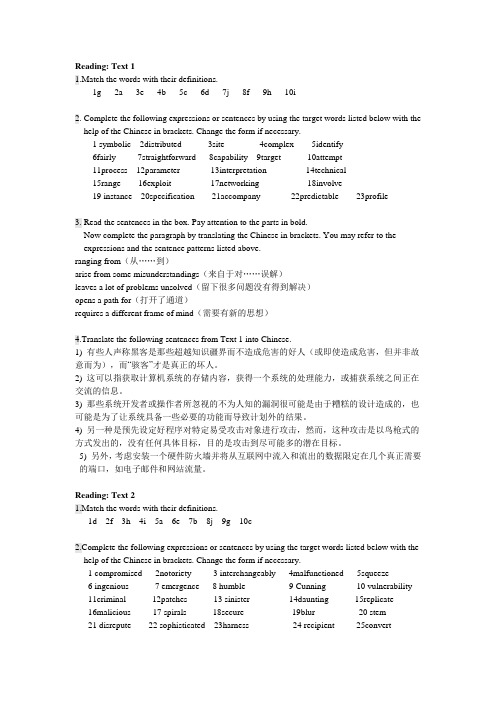
Reading: Text 11.Match the words with their definitions.1g 2a 3e 4b 5c 6d 7j 8f 9h 10i2. Complete the following expressions or sentences by using the target words listed below with the help of the Chinese in brackets. Change the form if necessary.1 symbolic 2distributed 3site 4complex 5identify6fairly 7straightforward 8capability 9target 10attempt11process 12parameter 13interpretation 14technical15range 16exploit 17networking 18involve19 instance 20specification 21accompany 22predictable 23profile3. Read the sentences in the box. Pay attention to the parts in bold.Now complete the paragraph by translating the Chinese in brackets. You may refer to the expressions and the sentence patterns listed above.ranging from(从……到)arise from some misunderstandings(来自于对……误解)leaves a lot of problems unsolved(留下很多问题没有得到解决)opens a path for(打开了通道)requires a different frame of mind(需要有新的思想)4.Translate the following sentences from Text 1 into Chinese.1) 有些人声称黑客是那些超越知识疆界而不造成危害的好人(或即使造成危害,但并非故意而为),而“骇客”才是真正的坏人。
学术英语Unit1 练习答案
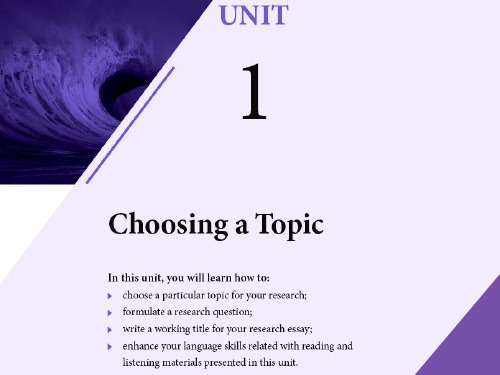
Unit 1 Choosing a Topic
1 Deciding on a topic
Enhancing your academic language
Translate the following sentences from Text 2 into Chinese.
4 间谍软件与垃圾邮件和钓鱼网络一起,构成了三个令人生 厌的互联网害虫。尽管有些程序可以通过入侵软件漏洞从 而进入电脑,但这些有害而秘密的程序通常会随着其他通 常是免费的应用软件侵入到计算机系统中。
the wedding 21 _a_c_c_o_m_p_a_n_y_ (陪伴) with her to watch movies
Unit 1 Choosing a Topic
1 Deciding on a topic
Enhancing your academic language
Complete the paragraph
Unit 1 Choosing a Topic
1 Deciding on a topic
Enhancing your academic language
Match the words with their definitions.
1 a(n) symbolic (象征的) gesture of love 2 The publisher distribute (分发) the book in Asia. 3 A “ site ” (地点) is a place, and so a website. 4 a(n) complex (复杂的) network of systems 5 be used to identify (识别) potential terrorists 6 deal the matter with him physically (完全地) 7 start with a pretty straightforward (直截了当) question 8 beyond the capability (功能) of the computers 9 hit the target (目标) at a distance 10 the person never attempt (尝试) to do anything more 11 a highly sophisticated process (过程)
学术英语(理工)详解答案_Unit 1ppt课件

Nanotechnol ogy
Internet
Artificial intelligence
– If the topic is too general, how do you narrow it down to a more manageable topic?
– Can you suggest some appropriate topics of each
. subject?
Unit 1 Choosing a Topic
1 Deciding on a topic
Topics Energy
Your narrower subtopics
Questions
– Is the topic appropriate for a 1500-word essay? Why or why not?
Genetic engineering
– If the topic is too general, how do you narrow it down to a more manageable topic?
Universe
– Can you suggest some appropriate topics of each
Lecture 1 Questions Lecture 2 Questions Lecture 3 Questions
.
Unit 1 Choosing a Topic
1 Deciding on a topic
Four principles of deciding on a topic
Interesting Important Manageable Adequate
学术英语 理工
学术英语(理工)_Unit 1

Unit 1 Choosing a Topic
1 Deciding on a topic
Enhancing your academic language
Translate the following sentences from Text 1 into Chinese.
1 有些人声称黑客是那些扩宽知识界限而不造成危害的好人 (或即使造成危害,但并非故意而为),而“破碎者”才 是真正的坏人。
学术英语理工类课后题答案
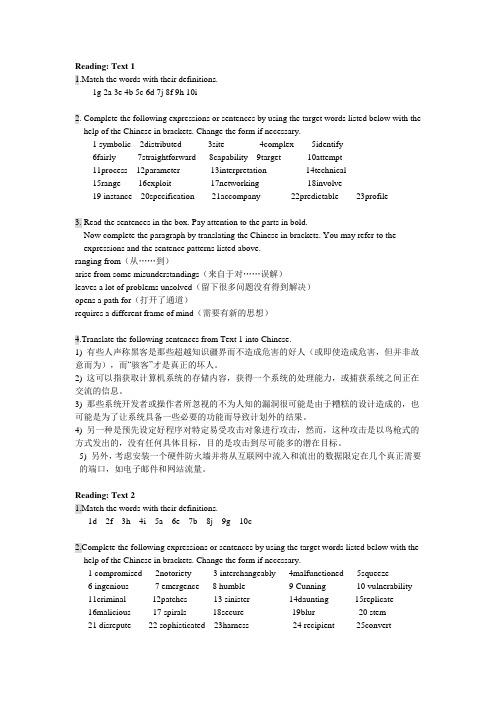
Reading: Text 11.Match the words with their definitions.1g 2a 3e 4b 5c 6d 7j 8f 9h 10i2. Complete the following expressions or sentences by using the target words listed below with the help of the Chinese in brackets. Change the form if necessary.1 symbolic 2distributed 3site 4complex 5identify6fairly 7straightforward 8capability 9target 10attempt11process 12parameter 13interpretation 14technical15range 16exploit 17networking 18involve19 instance 20specification 21accompany 22predictable 23profile3. Read the sentences in the box. Pay attention to the parts in bold.Now complete the paragraph by translating the Chinese in brackets. You may refer to the expressions and the sentence patterns listed above.ranging from(从……到)arise from some misunderstandings(来自于对……误解)leaves a lot of problems unsolved(留下很多问题没有得到解决)opens a path for(打开了通道)requires a different frame of mind(需要有新的思想)4.Translate the following sentences from Text 1 into Chinese.1) 有些人声称黑客是那些超越知识疆界而不造成危害的好人(或即使造成危害,但并非故意而为),而“骇客”才是真正的坏人。
学术英语理工类Unit1 课后练习答案
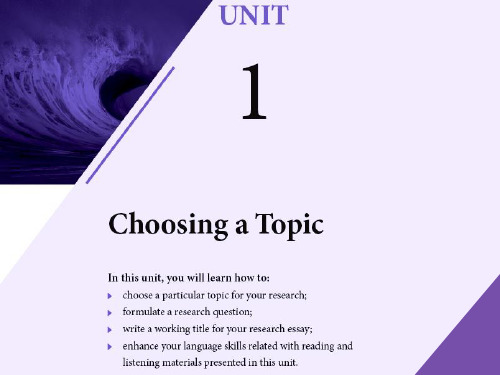
(来自于对……误解) of
cloud computing. Although the security of cloud computing ____________________________( leaves a lot of problems unsolved 留下很多问题没有得到解决), it opens a path for (打开了通道) the future development of computers. Hence a better understanding of a new technology requires a different frame of mind (需要有新的思想)_______________________________.
Enhancing your academic language
Match the words with their definitions.
1 —— d 2 —— f 3 —— h 4 —— i 5 —— a
6 —— e 7 —— b 8 —— j
9 —— g 10 —— c
Unit 1 Choosing a Topic
Unit 1 Choosing a Topic
1 Deciding on a topic
Ege
Translate the following sentences from Text 1 into Chinese.
1 有些人声称黑客是那些扩宽知识 界限而不造成危害的好人 (或即使造成危害,但并非故意 而为),而“破碎者”才是真正 的坏人。
Unit 1 Choosing a Topic
1 Deciding on a topic
Enhancing your academic language
学术英语理工类Unit-1答案知识分享

5. What are the major requirements of a research paper in terms of stylLeabharlann ?第二版学术英语 理工
Academic English for Science and Engineering
by He Canwen
Unit 1 Choosing a Topic
In this unit, you will learn how to: 1. ask probing questions in critical thinking; 2. have a better understanding of basic elements of
2. How many articles or research papers does the author cite? Why?
1. Critical Reading
How to read research articles
3. What are the characteristics of the language of a research paper? Is it more formal and objective or informal and subjective? Why?
Scan the text quickly and discuss the following questions with a partner.
- 1、下载文档前请自行甄别文档内容的完整性,平台不提供额外的编辑、内容补充、找答案等附加服务。
- 2、"仅部分预览"的文档,不可在线预览部分如存在完整性等问题,可反馈申请退款(可完整预览的文档不适用该条件!)。
- 3、如文档侵犯您的权益,请联系客服反馈,我们会尽快为您处理(人工客服工作时间:9:00-18:30)。
1. Critical Reading
Critical thinking (asking questions)
Group discussion:
1. What is Critical thinking (CT) ? 2. Why is CT important to university students
2. Why is a good knowledge of previous studies of the topic necessary?
Because it will contribute to the credibility of the research.
3. Why is the procedures section important?
4. Do you think it necessary to learn how to read and even write research papers? Why?
1. Critical Reading
How to read research articles
Read the article “Research Reports for Technical Writing” on Page 24-26 and answer the questions below.
1. How many basic elements are there in a research report or paper? What are they?
Four. They are problem section, procedures section, result section and discussion section.
as well as a citizen? 3. Why is asking questions important?
1. Critical Reading
2. How many articles or research papers does the author cite? Why?
1. Critical Reading
How to read research articles
3. What are the characteristics of the language of a research paper? Is it more formal and objective or informal and subjective? Why?
Unit Contents
1 Critical reading 2 Academic writing
3 Literacy skills
Critical thinking (asking questions) Understanding the text Enhancing language ability Doing Research Projects
It may evaluate the research results fully, point out what questions remain unanswered and perhaps suggest directions for further research.
5. What are the major requirements of a research paper in terms of style?
第二版
学术英语 理工
Academic English for Science and Engineeringg a Topic
In this unit, you will learn how to: 1. ask probing questions in critical thinking; 2. have a better understanding of basic elements of
Deciding on a topic Formulating research questions Writing a working title
Avoiding plagiarism Citations Quoting Summarizing
1. Critical Reading
How to read research articles
Scan the text quickly and discuss the following questions with a partner.
1. How many sections does a research paper contain? What are they? Why should it be divided into “Introduction”, “Methods” and other sections?
It can allow the reader to duplicate the experiment if there is some doubt about your findings.
1. Critical Reading
How to read research articles
4. What are the contents of the discussion section?
research papers; 3. choose a particular topic for your research; 4. formulate research questions; 5. write a working title (暂定标题); 6. avoid plagiarism; 7. use citations; 8. use sources by quoting and summarizing.
